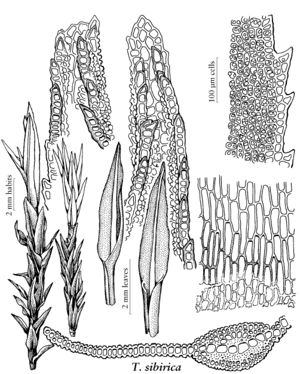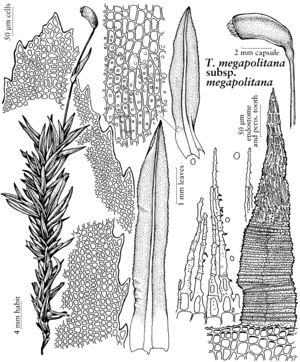Plants acrocarpous, large. Stems stiff, erect, mostly unbranched, in cross-section with a cortical region of small, thick-walled cells, a parenchyma of larger, thin-walled cells, and a distinct central strand; rhizoids abundant, especially on the proximal stems and in the leaf axils, dark reddish black, coarsely papillose, ca. 15–35 µm wide. Leaves lanceolate or long-lanceolate, with a sheathing, entire base occupying the proximal 1/6–1/3 of leaf, and a non-sheathing, serrate limb; costa strong, single, subpercurrent to excurrent, in cross-section (mid-limb) with large guide cells, two bands of stereids, and enlarged abaxial and adaxial cells; cells of limb lamina irregularly isodiametric or quadrate, smooth, papillose or mammillose on adaxial and abaxial surfaces; cells of the sheath lamina rectangular. Seta terminal, elongate, erect, single or double, 1.4–3.5 cm. Capsule pendulous to nearly erect, ovate to oblong-cylindric, smooth or broadly plicate; annulus large, revoluble; operculum hemispheric or conic, with distinct mamilla at the tip; stomata numerous on the neck or over the entire urn; peristome diplolepideous; exostome of 16 lanceolate teeth sometimes united near the base, smooth or papillose proximally, strongly vertically barred and papillose distally, with prominent projecting lamellae on the interior surface; endostome about the same height as the exostome, with a high basal membrane about half the height of the exostome, and 64 irregularly anastomosing, nodose cilia papillose externally and smooth or appendiculate on the interior surface. Calyptra linear-cylindrical.
Distribution
North America, Eurasia, n Africa, Pacific Islands (Hawaii, New Zealand).
Discussion
Genus 1, species 4 (4 in the flora).
Timmiaceae is a small, taxonomically isolated family.
Selected References
None.

